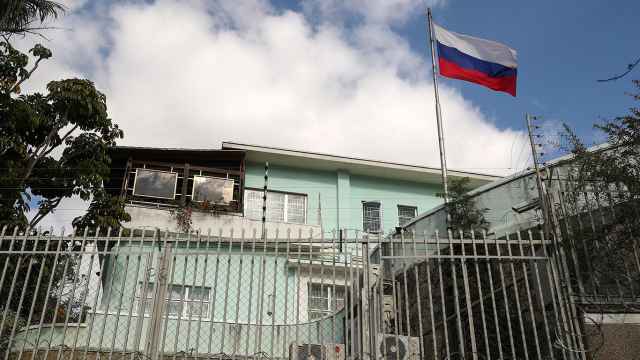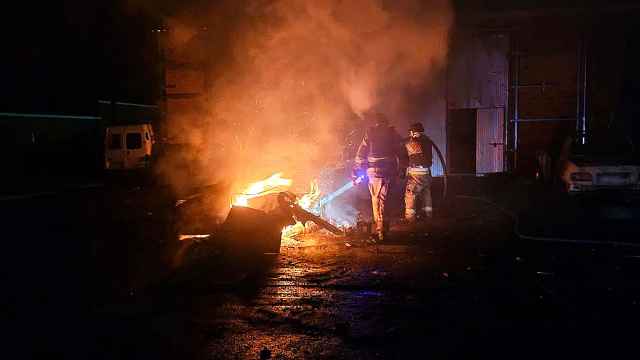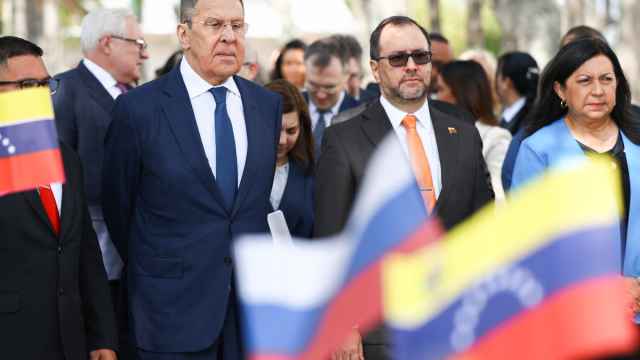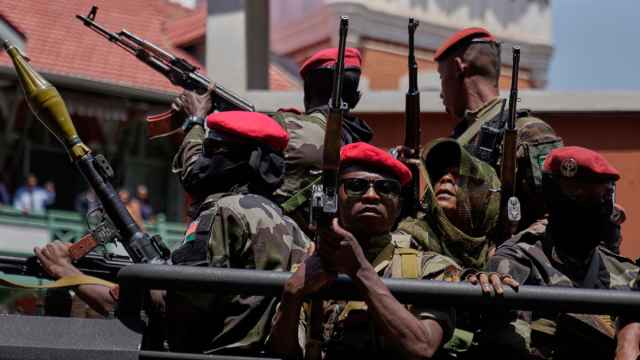Andrei Kolchanov, a 31-year-old telecom engineer from Tomsk, makes no secret of his nationalist and neo-Nazi sympathies.
When local officers from the Federal Security Service seized his computer in 2008, they found videos produced by the banned National Socialist Society and documents inciting hatred against Jews, Africans and other non-Slavs.
But because of a quirk in the country’s 2002 law on extremism, the virtually unknown Kolchanov has arguably become Russia’s most prolific extremist, with more than 300 individual documents listed in eight entries on the Justice Ministry’s central list of banned materials.
Adolf Hitler’s infamous manifesto “Mein Kampf” earned the Nazi leader a single line — at No. 604 in the list of 691 entries. Science fiction writer and Scientology founder L. Ron Hubbard occupies 29 spots on the list, each banning one of his writings or recordings on the controversial religion.
But Kolchanov’s eight spots — added by Tomsk’s Kirovsky District Court in 2009 — contain an unprecedented number of entries, ranging from overtly racist videos and songs to what he said were innocuous photos of his family and pet dog.
Kolchanov told The Moscow Times that he had posted many of the videos on his web site, which has since been taken offline, because he was “sympathetic” to ideas expressed in them, including anti-Semitism and the racial superiority of Slavs.
“Some of the things I liked, some things I didn’t,” he said.
Items can be placed on the extremism list by any local court, and in Kolchanov’s case, a long list of computer files was added — without any description of their contents.
While many of the documents bear provocative or offensive names — including the videos “Hitler’s Birthday,” and “Recipe for Cooking a Negro” — some are more ambiguous, such as “Countryhouse Story,” “Interview to Reuters” and “The History of Sberbank.”
Curiously, the Justice Ministry is not authorized to remove items from the list, which can only be done on appeal by a higher court. As a result, the list is slowly growing to include documents such as “09.wmv” and “listovka3.doc,” which will continue to be treated on par with Hitler’s writings under Russian law.
The legislation is also unclear about the consequences for owning or distributing files with identical names but differing contents. Law enforcement officials could see documents titled “Useful Advice” or “Trip to St. Pete” — both of which were on Kolchanov’s computer — and assume that they are extremist because of a previous court ruling.
Yelena Lebedeva, a spokeswoman for the Investigative Committee’s branch in Tomsk, told The Moscow Times that experts, including philology professors from local universities, had confirmed the extremist nature of all the materials confiscated from Kolchanov.
Distribution of extremist materials, an administrative offense, can be punished by detention of up to 15 days or a fine of up to 3,000 rubles, or about $100. Legal entities caught with extremist materials could be fined up to 100,000 rubles and closed for up to 90 days.
Kolchanov was convicted on the more serious felony charge of inciting ethnic hatred and was sentenced to 180 hours of community service. Depending on the nature of the crime, the charge can carry a sentence of up to five years in prison.
He said his days of posting videos on the Internet were over, but he is not giving up his right-wing views.
“Vavilov didn’t give up his genetics, why should I?” Kolchanov said, referring to renowned agricultural scientist Nikolai Vavilov, who died in a prison camp in 1943 after clashing with Stalin-backed agronomists who protested his pioneering genetic research.
Kolchanov also said he has maintained ties with the far-right National Socialist Society, or NSO, which the Supreme Court banned as an extremist organization in February. One of the now-banned videos found on Kolchanov’s computer was called “NSO Fighters’ Training.”
The NSO was known to conduct paramilitary training in abandoned buildings outside Moscow, and many of its members are veterans of the first Chechen war in the mid-1990s.
The FSB noticed Kolchanov’s site after he started distributing videos through a popular torrent service and quickly pressured him into confessing, he said.
“They didn’t beat me, but I gave in to the psychological pressure,” he said, adding that they threatened to bring other, more serious charges against him.
Some of the films that Kolchanov distributed were produced by Format 18, a studio formed in 2005 by a group of prominent Russian skinheads, including Maxim Martsinkevich, who was sentenced in January 2009 to three years imprisonment for inciting ethnic hatred.
The story of Martsinkevich’s studio inspired filmmaker Pavel Bardin to make the mockumentary “Russia-88,” which was released in 2008. The film, which tells the story of neo-Nazis who film their attacks, was well-received by film critics, who praised its anti-Nazi message.
Ironically, prosecutors in Samara sought to have the film banned for extremism earlier this year, although a local court declined to add it to the list.
Legal experts have long criticized vagaries of the extremism law, saying it opens the door to frivolous charges and distracts from efforts to crack down on Islamist extremism and skinheads.
Galina Kozhevnikova, an expert at the SOVA Center, which studies extremist movements in Russia, said that by presenting “loads of materials” without proper description, law enforcement officials “discredit” their own efforts to combat extremism.
“It is not work, but the imitation of work,” she said.
A Message from The Moscow Times:
Dear readers,
We are facing unprecedented challenges. Russia's Prosecutor General's Office has designated The Moscow Times as an "undesirable" organization, criminalizing our work and putting our staff at risk of prosecution. This follows our earlier unjust labeling as a "foreign agent."
These actions are direct attempts to silence independent journalism in Russia. The authorities claim our work "discredits the decisions of the Russian leadership." We see things differently: we strive to provide accurate, unbiased reporting on Russia.
We, the journalists of The Moscow Times, refuse to be silenced. But to continue our work, we need your help.
Your support, no matter how small, makes a world of difference. If you can, please support us monthly starting from just $2. It's quick to set up, and every contribution makes a significant impact.
By supporting The Moscow Times, you're defending open, independent journalism in the face of repression. Thank you for standing with us.
Remind me later.





